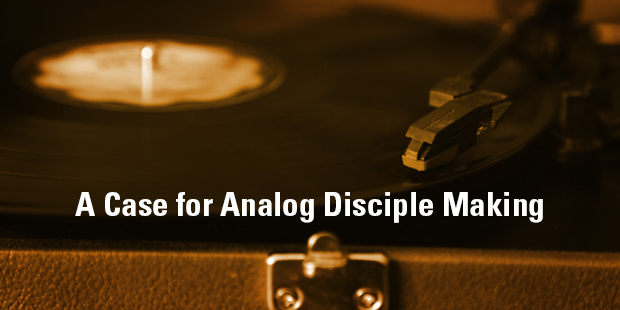
A Case for Analog Disciple Making
Is digital on the way out? Is analog on the way in?
A new book by David Sax, The Revenge of Analog: Real Things and Why They Matter, focuses on recent movement away from digital technology and back toward “real things” like vinyl records, board games, hardcover books, and face-to-face education.
I’ve experienced this phenomenon. A few years ago, when I was riding the bus to work every day, nearly half the books I read were on my Kindle. Today, that number has plummeted to maybe 10 percent or less. I am back to reading print and enjoying the experience more than ever.
I am not alone. Last year, hardcover books outsold ebooks, something that would have been considered unthinkable a few years ago.
The Revenge of Analog‘s analysis goes beyond “nostalgia” for past possessions. According to Sax, we invest physical objects with significance. There is something about pulling a book down off the shelf and thumbing through all our notes that is irreplaceable by an ebook, no matter how many highlights we made.
To be clear, this book doesn’t claim that digital innovations will disappear, or that we will see a massive retreat from a digital future. But Sax does believe that in a digital world, certain physical objects become morevaluable, not less. In other words, the revenge of analog does not mean that ebooks will now go away. It means that print is not dead, nor will it die, and what is printed may matter more.
Analog Classrooms
The same goes for education. Sax points out the rise and fall of the MOOC–the Massive Online Open Courses–that began in 2008 and took off in 2012. Today, the MOOC phenomenon has receded, due partly to “dismally low completion rates for those who enrolled” and “mediocre achievement rates for the few who finished.” Some studies show that more than 90 percent of people who enrolled dropped out.
Sax believes the key to education is the teacher, and no matter how good your digital strategy is, the classroom experience cannot be fully replicated online. He writes:
“Teachers are the key to analog education’s past, present, and future, and no technology can or should replace them. Not because they have the most knowledge, but because without them, education is no more than facts passed back and forth. If you want facts, go read a book. If you want to learn, find a teacher.” (202)
Sax also points out the community aspect of a physical classroom, where everyone is learning something together.
“Analog education, which happened in classrooms between teachers and students, and between students and other students, was more than just the transfer of data. That was the basis. But what teachers did, and could only do in the flesh-and-blood, person-to-person environments we call schools, was to take that raw information and mold it into knowledge.” (203)
Analog Discipleship
I wonder what this refocus on flesh-and-blood engagement will mean for discipleship. We live in a time when it is easier than ever to access good content.
- You can download podcasts or listen to great preachers from our era or previous eras.
- You can subscribe to the Great Courses and walk through various subjects.
- YouTube may be a wasteland of cat videos and movie clips, but it’s also a place where you can find lecture after lecture from some of the most eminent scholars in the world.
- Without ever leaving your living room, you can read all the books you want from the ancient church fathers. You can find Puritan literature for free online. Dozens of books from last century’s writers, like G. K. Chesterton, are available on Kindle for less than a couple dollars.
Now, it is easy for people to have access to all of this knowledge and think that this is the path to discipleship. Watch the right content, download the right lecture, read the right Bible study, and you’ll grow as a Christian. It’s never been easier to get great content.
But you need more than good content to disciple you; you need godly Christians. While content from Christians may aid in your discipleship process, you need real-life flesh-and-blood, Spirit-filled Christiansaround you to help you become more like Jesus.
There is no such thing as digital-only discipleship. It’s all analog, because we are embodied people who long for real life community that goes beyond virtual hangouts. Furthermore, pursuing knowledge apart from relationship can become a vice instead of a virtue, the kind of knowledge that puffs up but does not edify.
Disciple-making is accomplished by modelers, not just messengers. We develop not merely through cognitive transfer, but also through witnessing the lives and choices of other disciples we encounter on our way. Perhaps this is the reason why the Old Testament emphasizes meditation and memorization of Scripture alongside conversations about the Law that take place in the daily rhythms of life.
The teachers who make the biggest difference on our lives are those who not only give us knowledge but who know us well enough to speak truth into the specifics of our lives, to give counsel from their vast experience and biblical storehouse. That’s why we can have confidence that analog discipleship isn’t going away any time soon. This is the one-on-one discipleship that builds up the church and changes the world.
Want to learn how to make stronger disciples in your church? Connect with an Auxano Navigator for more information.

Tags: Trevin Wax, disciple making












